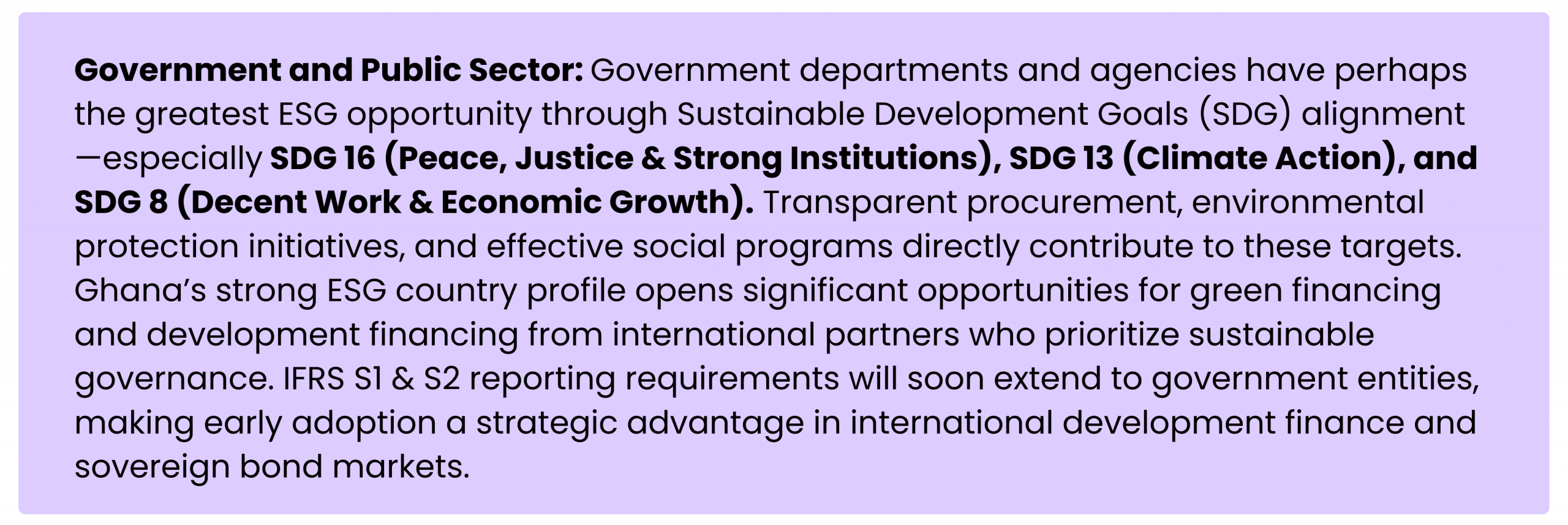
In boardrooms and government offices across Ghana, “ESG” and “Sustainability” spark either enthusiasm or anxiety. For some leaders, these represent opportunity and competitive advantage. For others, they conjure images of complex compliance requirements, endless reports, and costly initiatives with unclear returns.
Ghana stands at a pivotal moment. While many organizations worldwide struggle to implement Environmental, Social, and Governance (ESG) practices, Ghanaian businesses and government institutions possess natural advantages that can transform ESG from a compliance burden into a powerful competitive differentiator.

Let’s cut through the complexity. ESG isn’t about academic theories or complicated frameworks—it’s fundamentally about identifying where your organization creates social value, environmental stewardship, and business value, then finding where these three intersect and align. This “sweet spot” is where sustainable competitive advantage lives and where your ESG efforts and communications should focus.
For Ghanaian organizations, this intersection often aligns naturally with existing cultural values of community support, resource stewardship, and long-term thinking.

The challenge isn’t creating ESG value—it’s recognizing it, aligning it with global standards like IFRS S1 & S2, and systematically capturing and communicating it.
Ghana enters the ESG arena with significant built-in advantages:
These foundations mean Ghana can move faster than many peers—building on strengths instead of starting from scratch.
The Danger of Overcomplication
Many Ghanaian companies and agencies are already engaged in ESG-aligned work and creating valuable impacts—they just don’t present it that way. A cocoa exporter training farmers, a utility reducing water losses, or a ministry digitizing public services is already creating ESG value. The opportunity lies in identifying, measuring, aligning with standards, and effectively communicating these actions to stakeholders.





For Businesses:
For Government Entities:
For All Organizations:
Organizations that move first in Ghana’s ESG transformation will capture multiple advantages: preferential access to international capital, reduced regulatory risk, enhanced talent attraction and retention, stronger community relationships, and improved operational efficiency.
The global shift toward sustainable business practices isn’t slowing down—it’s accelerating. Ghana can either lead this transformation in Africa or follow. The choice belongs to today’s business and government leaders.
ESG done right isn’t about compliance—it’s about competitive advantage. Ghana’s natural strengths position us perfectly to demonstrate that sustainable practices and strong financial performance aren’t just compatible—they’re complementary.
Next week, we’ll explore ESG Reporting & Communications Made Easy—practical strategies for effectively communicating your ESG value without getting lost in complex frameworks or overwhelming stakeholders with unnecessary detail.
Prof. Wayne Dunn is President & Founder of the CSR | ESG Training Institute and former Professor of Practice in CSR at McGill University. The Institute’s ESG & Sustainable Finance Certified Masterclass takes place September 29-October 2, 2025, in Accra.